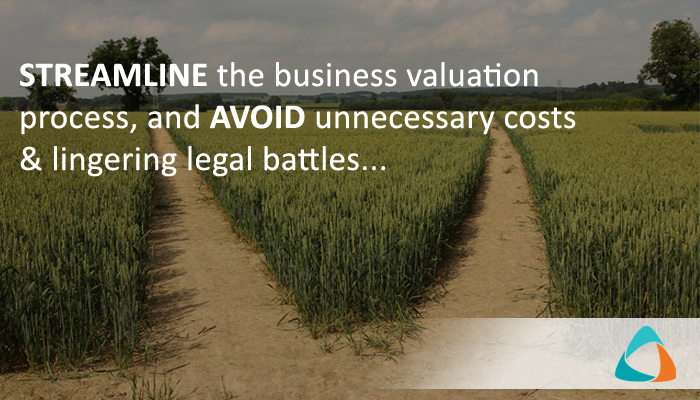Best Practice Recommendations for Business Valuations During Divorce
The divorce process can be stressful and emotional. There are many financial decisions to be made especially when there is a family owned business involved. A family business can have significant value and be the largest family asset or it can just be a source of income providing the owner with a job. When there is a business involved in the context of a divorce, AAFCPAs advises that you consider the following:
When there is a business involved consider the following:
Jointly Hire One Independent Appraiser
 It is becoming more commonplace to save costs, and avoid battle scenarios, by hiring one independent appraiser who can serve as a trusted advisor to both parties. The cost of divorce is expensive and one independent appraiser can meet the needs of both parties, streamline the process and save money. In addition, certified/credentialed appraisers are held to a code of professional conduct that requires independence from the consequences of the conclusion of value. If litigated, it cannot be perceived that an appraiser was biased toward any side when reaching the conclusion of value. Be wary of an appraiser who appears to advocate for one side, promising to issue an opinion that is as high or as low as “they can defend.”
It is becoming more commonplace to save costs, and avoid battle scenarios, by hiring one independent appraiser who can serve as a trusted advisor to both parties. The cost of divorce is expensive and one independent appraiser can meet the needs of both parties, streamline the process and save money. In addition, certified/credentialed appraisers are held to a code of professional conduct that requires independence from the consequences of the conclusion of value. If litigated, it cannot be perceived that an appraiser was biased toward any side when reaching the conclusion of value. Be wary of an appraiser who appears to advocate for one side, promising to issue an opinion that is as high or as low as “they can defend.”
Choose A Qualified Appraiser
The appraisal field is constantly changing. AAFCPAs advises that you retain a fully qualified appraiser with the right body of knowledge to ensure the necessary quality control.
When vetting candidates, consider the following:
- What are their credentials or professional designations? Credentials indicate earned expertise in business valuation, and often require passing of rigorous examinations. Seek an appraiser with one or more of the following credentials: Accredited in Business Valuation (ABV), Accredited Senior Appraiser (ASA), Certified Valuation Analyst (CVA), and Certified Business Appraiser (CBA).
- What is the depth and breadth of their experience? The valuation field is consistently changing and keeping up with all the changes can be difficult, unless it is a full-time focus. Seek an appraiser with demonstrated experience and the appropriate knowledge.
- How are their communication skills? Find someone you are comfortable working with. Make sure this is a person you can communicate with and someone who can communicate back to you in a way that you understand.
- Are they independent? To reiterate, be wary of an appraiser who appears to advocate for one side. If litigated, the opposing counsel is certain to inquire about your appraiser’s objectivity and integrity, and any potential conflicts of interest.
Choose the Right Type of Valuation
In many cases, AAFCPAs suggest that clients start out with a low level valuation but prepare to move up to the next level of reporting if the litigation moves forward.
Calculation of Value – Calculations of value can be cost effective, and are often used in the preliminary stages of a divorce for beginning the negotiation process. The calculation of value may suffice in amicable divorce situations; however, it would not be appropriate in cases that result in litigation. A calculation engagement allows for fewer procedures than a valuation engagement, and is less costly. Calculations are more widely used by business owners needing to run scenarios for planning purposes. For example, if the business took on an additional division and generated X amount of revenue and net income, what would be the resulting value of the business?
Conclusion of Value – In the context of a divorce, attorneys and judges will require the formal reporting of a conclusion of value from an independent and objective appraiser in order to rule on the equitable distribution of the marital asset. A valuation engagement has no scope limitations, requires more procedures than a calculation engagement, results in a conclusion of value, and thus is generally more expensive. There are reporting options which can help contain the cost of the valuation engagement. You can request an oral report, a letter report, a summary report or a detailed report.
The divorce process can be stressful, emotional, and expensive – and businesses can often be a source of conflict in a marriage. There are opportunities to streamline the business valuation process that can avoid unnecessary costs, lingering legal battles, and issues that could bankrupt a closely held company. Couples need objective, independent, and expert advice to minimize controversy and delay, and to make each individual feel as comfortable as possible as they move onto the next phase of theirs lives.
AAFCPAs team members are passionate about creating client-centered processes for resolving conflict. We provide specialized valuation solutions for business owners for the purpose of marital dissolutions, life insurance, shareholder buyouts and disputes, mergers & acquisitions, buy/sell agreements, and succession planning.
